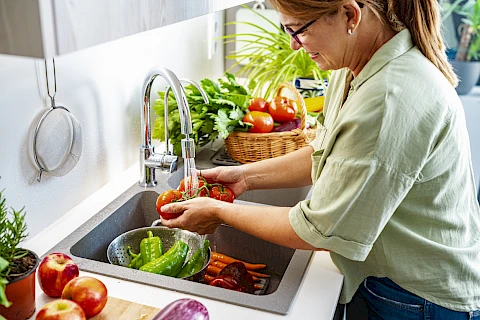
Cooking is a daily activity that many of us enjoy, but it can pose unique challenges for seniors. Safe cooking practices ensure that our elderly loved ones remain healthy and injury-free. Caregivers can offer vital assistance that makes it easier for seniors to stay safe in the kitchen.
Food Handling Safety
Proper food handling is the first step toward safe cooking. Seniors can be more susceptible to foodborne illnesses, so following safety guidelines is especially important. Always wash your hands thoroughly with warm water and soap for at least 20 seconds before and after handling food. Clean all kitchen surfaces and utensils before preparing food, and wash fruits and vegetables under running water. When handling raw meat, keep it separate from other foods and use different cutting boards for meat and vegetables to avoid cross-contamination—Sanitize surfaces and utensils after handling raw meat.
Food Storage Guidelines
Proper food storage is another critical component of safe cooking. To slow down the growth of bacteria, maintain your refrigerator at or below 40°F (4°C) and your freezer at 0°F (-18°C). Use a thermometer to check temperatures regularly. Store leftovers in airtight containers and refrigerate them within two hours of cooking. Consume leftovers within 3-4 days to avoid the risk of foodborne illness. Label all stored food with the date prepared or bought to help keep track of storage time.
Kitchen Safety Modifications
Making some simple changes in the kitchen can drastically reduce the risk of accidents and make cooking easier for seniors. Ensure your kitchen is well-lit to reduce the risk of accidents and make it easier to read labels and measure ingredients. Place non-slip mats in front of the sink and stove, and avoid throw rugs that can cause trips and falls. Store commonly used items like pots, pans, and spices in easily accessible places that are reachable without assistance to reduce the need for bending or reaching.
Adapting Cooking Methods for Physical Limitations
Physical limitations can make cooking challenging, but adapting some methods can help maintain independence in the kitchen. Consider using these strategies:
- Use ergonomic kitchen tools designed to be easier on the hands and wrists, such as knives with comfortable grips, lightweight pots and pans, and easy-to-use can openers.
- Choose straightforward recipes that require minimal steps to make the cooking process easier and reduce the chance of errors or accidents.
- Utilize slow cookers, microwaves, and toaster ovens as alternatives to traditional stoves and ovens. These appliances require less supervision and effort, reducing the risk of burns and other injuries.
With a few simple modifications, many seniors can continue to cook safely despite changes in physical capability.
Provide More Support in the Kitchen and Out
Safe cooking practices are essential for seniors to continue enjoying their independence in the kitchen while minimizing risks. By following food handling and storage guidelines, making kitchen modifications, and adapting cooking methods, you can create a safer cooking environment for your elderly loved ones.
If you need further assistance or professional help at home, including help with meal planning or prep, don't hesitate to contact Senior Helpers Greater OKC. We serve Oklahoma City, Edmond, and Norman and are here to provide the support you need.